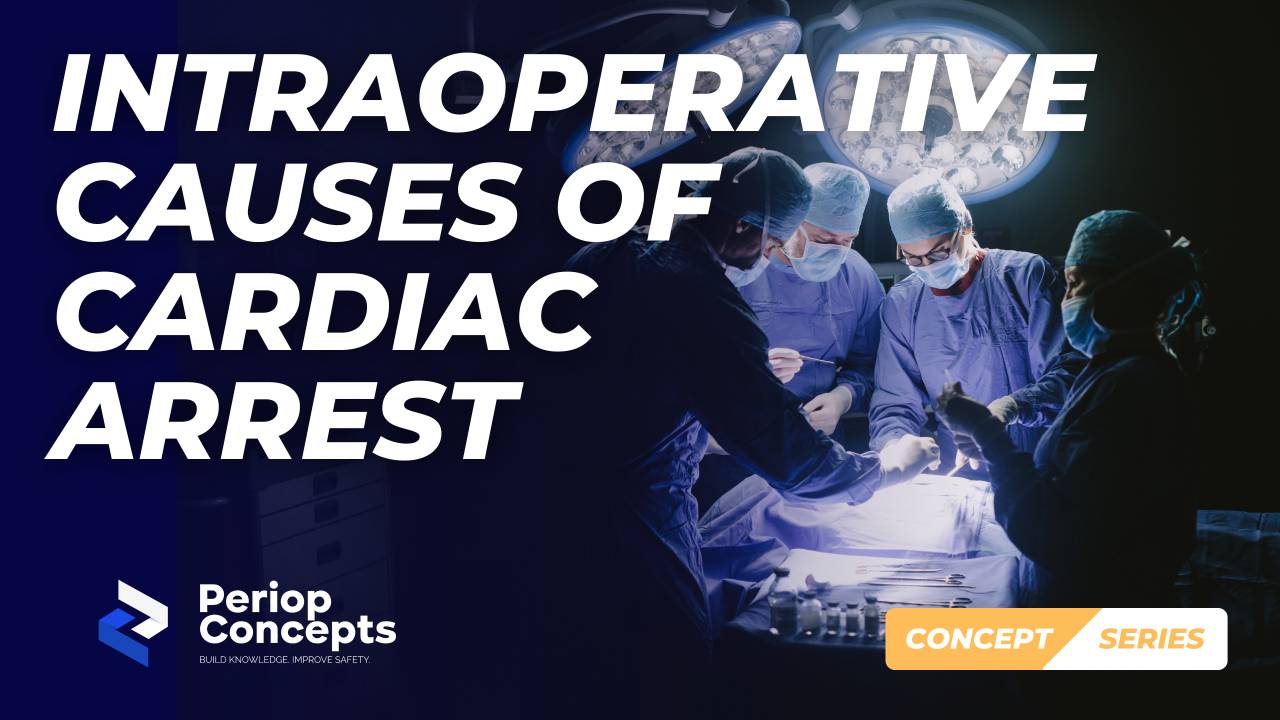Intraoperative Causes of Cardiac Arrest
Mar 30, 2025
What have we done? Intraoperative causes of cardiac arrest
We all know the four H’s and T’s of reversible causes for cardiac arrest, but in the perioperative setting, sometimes these need to be teased out even further to discover the true cause of arrest. 🤔
There are many things we do both surgical and in anaesthesia that may be the catalyst for cardiac arrest 💥 - here are some potential intraoperative causes of arrest to consider along with the 4 H’s and T’s! ⚠️
Anaesthesia related causes: 💉
🩺 Anaphylaxis - some common drugs given during anaesthesia, such as muscle relaxants, antibiotics and chlorhexidine can trigger anaphylaxis.
🧠 Malignant Hyperthermia - triggered by certain muscle relaxants and volatile agents, MH is a medical emergency that will eventually lead to cardiac arrest if untreated. 🚨
💉 LAST - local anaesthetic toxicity, if undetected or not treated quickly enough will also lead to cardiac arrest. 🚑
🔴 Total spinal (subarachnoid block) - a rare complication of spinal anaesthesia where there is excessive spread of LA, resulting in profound sympathetic, sensory and motor blockade which can lead to cardiac arrest.
💨 Hypoxia - during difficult airway scenarios, CICO, dislodgement.
Surgical causes: ⚒️
🩸 Haemorrhage - massive blood loss during surgery can lead to hypovolaemic shock, circulatory collapse and cardiac arrest. Significant blood loss can also lead to deranged electrolytes causing arrhythmias. 🩺
🌬️ Embolism - including air, fat and amniotic embolisms, these can be triggered by pulse lavage, placental or uterine rupture, malfunctions of irrigation or intravenous tubing lines. 🚑
⚡ Vagal stimulation - strong vagal stimulation, which can be seen in abdominal (open and laparoscopic) and thoracic surgeries, can cause severe bradycardia.
❄️ Hypothermia - patients with significant exposure and/or prolonged surgical time are at risk of significant temperature drops which can lead to arrhythmias and cardiac arrest.
Patient factors:
Including significant co-morbidities, regular medications, and the type of surgery (and reasons for the surgery) must also be considered when determining cause for arrest. ⚖️
Clearly, perioperative arrest is an extremely complex scenario that has many causes to consider, only highlighting further the importance of solid teamwork, communication and a shared mental model to promote positive outcomes for our patients in these crisis scenarios. 🧑⚕️👩⚕️
Build Knowledge✅
Improve Safety ✅
References:
Braz, L.G., Modolo, S.P., Nascimento, P., Bruschi, B.A., Castiglia, Y.M., Ganem, E.M., de Carvalho, L.R., Braz, J.R. (2006) Perioperative cardiac arrest: a study of 53718 anaesthetics over 9 years from a Brazilian teaching hospital. BJA V 96(5). Pp 569-575.https://doi.org/10.1093/bja/ael065
Meng, L.,Rasmussen, M., Abcejo, A. S., Meng, D. M., Tong, C., Liu, H. (2024) Causes of Perioperative Cardiac Arrest: Mnemonic, Classification, Monitoring, and Actions. Anesthesia & Analgesia V 138(6) pp 1215-1232. DOI: 10.1213/ANE.0000000000006664https://doi.org/10.1093/bja/ael065
Stay connected with news and updates!
Join our mailing list to receive the latest news and updates from our team.
Don't worry, your information will not be shared.
We hate SPAM. We will never sell your information, for any reason.



